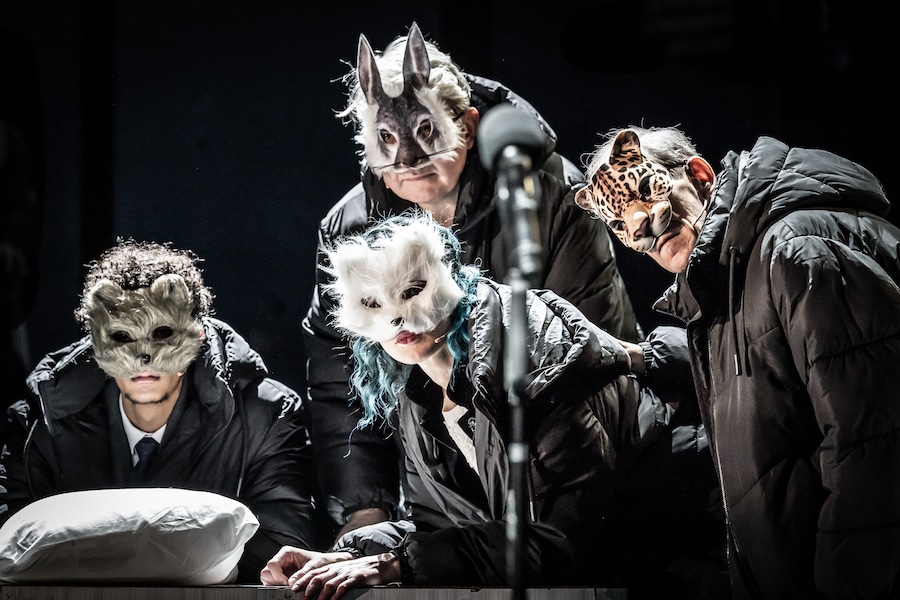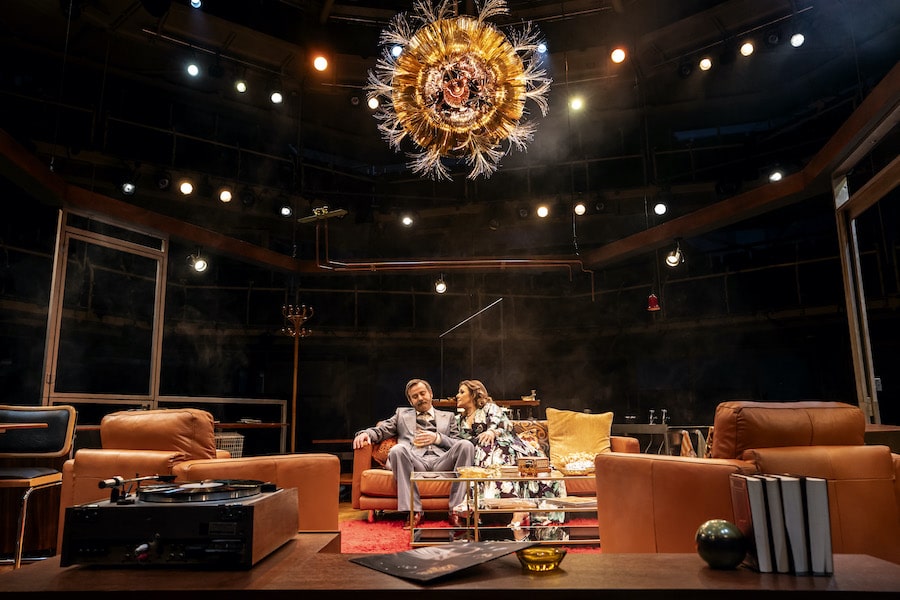Review: Drive Your Plow Over the Bones of the Dead at the Lowry is ‘spellbinding, claustrophobic and thought provoking’
- Written by Thom Bamford
- Last updated 2 years ago
- Theatre

This production at The Lowry by Complicité is a rare and innovative treat.
Complicité is a British theatre company founded in 1983 by director Simon McBurney and a group of actors.
The ensemble cast features long-standing Complicité collaborators, alongside new performers working with the company for the very first time and includes Thomas Arnold, Johannes Flaschberger, Amanda Hadingue, Kathryn Hunter, Kiren Kebaili-Dwyer, Weronika Maria, Tim McMullan, César Sarachu, Sophie Steer and Alexander Uzoka.
The company is known for its innovative and experimental approach to theatre, combining physical theatre, text, and multimedia elements to create unique and immersive theatrical experiences.
This production of a now iconic book that scooped the Nobel Prize for literature is no different.
The narrative of the performance is driven by a towering performance from Olivier award-winning actress and director, Kathryn Hunter.

Kathryn plays Janina Duszejko, a retired teacher and animal rights activist, who becomes involved in a series of bizarre deaths of local hunters.
She drives the narrative forward speaking into a microphone at the front of the stage, serving as both the narrator and the main character, and her voice is characterised by a mix of dry wit, philosophical musings, and poetic imagery.
Despite the sometimes dark subject matter, her humour keeps the audience involved and on the edge of their seats.
As the story develops, Janina suspects that animals are taking revenge on humans for their cruelty and mistreatment.
Janina’s theories are ridiculed by the local police and villagers, but she continues to investigate and eventually uncovers the truth.
Throughout the play, Janina’s voice is the primary lens through which the audience experiences the story.
She is fiercely intelligent and perceptive, with a keen eye for detail and a deep understanding of human and animal behaviour.
Janina’s character is also shaped by her isolation.
She lives alone in a remote cabin and is largely disconnected from the outside world.
She struggles to connect with the other villagers, who view her as odd and eccentric, and she finds solace in her books and her animals.
She is a complex and multi-dimensional character whose voice and perspective are central to the novel’s themes and narrative.
In Complicité style, the stage is claustrophobic, atmospheric with disorientating blasts of music, light, and horoscope projections which add to a pernicious sense of mystery.
The costume designs are amazing, with animal masks, fancy dress, and hooded characters moving surreptitiously in the shadows.
A troupe of dancers accompany the play’s action with disorienting, unnatural movements that add a huge swathe of tension and feeling to proceedings.
The performance bursts into scenes from complete darkness, with no visible preparation or removal of stage props.
The seamless transition between present and past is so fluid that it appears to be one continuous motion.
The use of the back-screen is ingeniously employed, projecting Janina’s nightmares of her deceased mother in a style reminiscent of Hitchcock’s signature style.
The major breakdowns from the play are punctuated with lines from the English Poet William Blake.
This is because William Blake’s philosophy and poetry are closely aligned with the themes of the novel, particularly the idea that all living beings are interconnected and that the natural world has a spiritual dimension.
William Blake’s philosophy of “radical interconnectedness” is also reflected in the novel’s exploration of the relationship between humans and animals.
In Blake’s view, all living beings are part of a unified spiritual entity, and this idea is echoed in Janina’s belief that humans and animals are equal and that the mistreatment of animals is a violation of the natural order.
While Janina Duszejko is the main character, there are also notable performances by César Sarachu as Oddball.
Oddball is a young man who lives near the protagonist, Janina Duszejko.
He is an outsider in the small, rural community and is seen as unconventional and strange by the other villagers.
However, Janina comes to appreciate his unique perspective and his willingness to challenge traditional values.
Oddball shares Janina’s views on the interconnectedness of all living beings and becomes involved in her quest to uncover the truth about the local hunters who are killing the wildlife.
His character serves as a symbol of a different way of seeing and being in the world, challenging readers to question their assumptions and beliefs.
One of the other great performances is by Dizzy, played by Kiren Kebaili-Dwyer.
Dizzy helps Janina translate William Blake, and is a shy character but helps shine a light on the narrative twists and turns through the words of the poet.
Dizzy is a former student of English who now works as a translator and teaches the subject to children in the village. He is also a vegan and an animal rights activist like Janina.
Dizzy is depicted as a sensitive and empathetic character who cares deeply about the natural world and its inhabitants.
He is often portrayed as a foil to other male characters in the novel who are more aggressive or dismissive of Janina and her beliefs. Dizzy is also an outsider in the village due to his unconventional lifestyle and interests, much like Janina and her other friends.
Credit must go to set and costume design by Rae Smith, lighting design by Paule Constable, sound design by Christopher Schutt and video design by Dick Straker for creating such an intense masterpiece on stage.
Intriguing, illuminating and disorientating, the set design and lighting add to the tensions of the play and creates a memorable experience that you’ll be thinking about weeks later.
It is difficult to surmise what an important work of literature this is.
It speaks to many of the pressing issues that confront us in the modern world, including environmentalism, animal rights, and social justice.
A philosophical and poetic murder mystery, Drive Your Plow Over the Bones of the Dead is a rallying cry for nature and a love-letter to the poetry of Blake.
At its heart it is a playful and profound work that asks us to consider what it means to live in harmony with the world around us, our place in the ecosystem, and the perilous consequences we all face if our connection to the natural world is lost.
Add into the mix what is a fantastic, spellbinding, claustrophobic and thought-provoking production and you’re absolutely on to a winner.
Go and see it, you won’t regret it.
It’s on from Tue 25 April – Sat 29 April.
- This article was last updated 2 years ago.
- It was first published on 26 April 2023 and is subject to be updated from time to time. Please refresh or return to see the latest version.
Did we miss something? Let us know: press@ilovemanchester.com
Want to be the first to receive all the latest news stories, what’s on and events from the heart of Manchester? Sign up here.
Manchester is a successful city, but many people suffer. I Love Manchester helps raise awareness and funds to help improve the lives and prospects of people across Greater Manchester – and we can’t do it without your help. So please support us with what you can so we can continue to spread the love. Thank you in advance!
An email you’ll love. Subscribe to our newsletter to get the latest news stories delivered direct to your inbox.
Got a story worth sharing?
What’s the story? We are all ears when it comes to positive news and inspiring stories. You can send story ideas to press@ilovemanchester.com
While we can’t guarantee to publish everything, we will always consider any enquiry or idea that promotes:
- Independent new openings
- Human interest
- Not-for-profit organisations
- Community Interest Companies (CiCs) and projects
- Charities and charitable initiatives
- Affordability and offers saving people over 20%
For anything else, don’t hesitate to get in touch with us about advertorials (from £350+VAT) and advertising opportunities: advertise@ilovemanchester.com

Meet the Salford creators changing the face of digital storytelling

Tradition gets a makeover in WAKE – the electrifying Irish show coming to Factory International

Manchester gets a ‘Guggenheim’ moment as Campfield Market is reborn

Irresistible tapas spots in Manchester that’ll make you feel like you’re in Spain

“Manchester is not Britain’s second city, it’s the first” – Jeremy Clarkson














